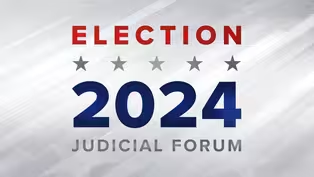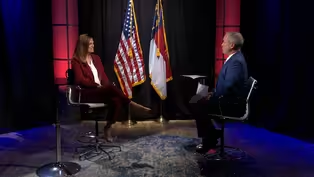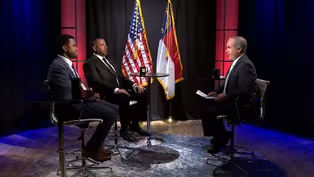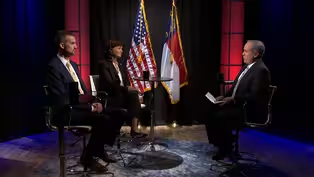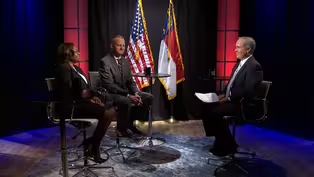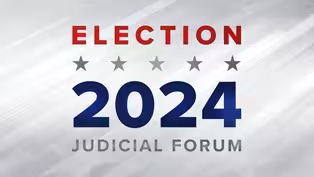
NC Supreme Court Candidate Jefferson Griffin (R)
Season 2024 Episode 7 | 6m 43sVideo has Closed Captions
NC Supreme Court candidate Jefferson Griffin (R) discusses the position.
Candidate Jefferson Griffin (Republican) discusses his background and why he's running for NC Supreme Court with PBS NC's Kelly McCullen. These interviews are a partnership with the NC Bar Association.
Problems playing video? | Closed Captioning Feedback
Problems playing video? | Closed Captioning Feedback
Election is a local public television program presented by PBS NC
The 2024 Judicial Candidates Forum is made possible by a partnership between PBS North Carolina and the North Carolina Bar Association.

NC Supreme Court Candidate Jefferson Griffin (R)
Season 2024 Episode 7 | 6m 43sVideo has Closed Captions
Candidate Jefferson Griffin (Republican) discusses his background and why he's running for NC Supreme Court with PBS NC's Kelly McCullen. These interviews are a partnership with the NC Bar Association.
Problems playing video? | Closed Captioning Feedback
How to Watch Election
Election is available to stream on pbs.org and the free PBS App, available on iPhone, Apple TV, Android TV, Android smartphones, Amazon Fire TV, Amazon Fire Tablet, Roku, Samsung Smart TV, and Vizio.
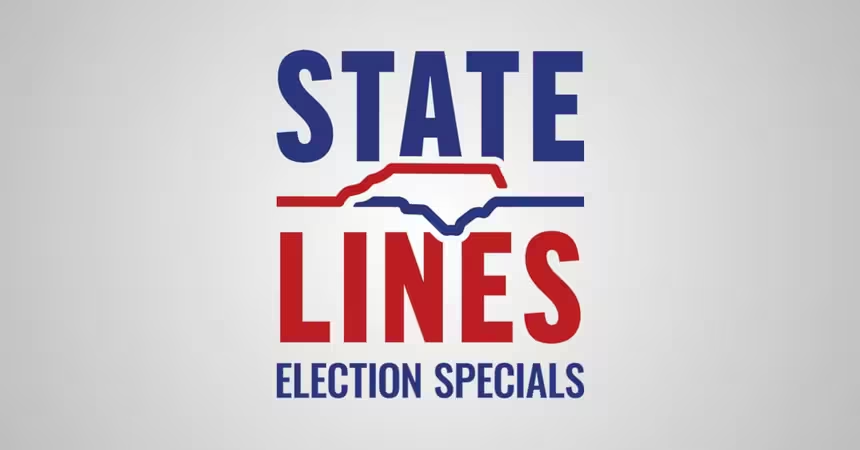
Council of State Candidate Interviews
During major election cycles, State Lines host Kelly McCullen sits down for in-depth conversations with candidates running for Governor and Council of State positions.Providing Support for PBS.org
Learn Moreabout PBS online sponsorshipMore from This Collection
2024 NC Judicial Forum
2024 NC Court of Appeals Seat 15 & Supreme Court Seat Candidates
Video has Closed Captions
St. 15: Chris Freeman (R) & Martin Moore (D). Supreme C.: Jefferson Griffin (R) & Allison Riggs (D). (26m 46s)
NC Supreme Court Candidate Allison Riggs (D)
Video has Closed Captions
NC Supreme Court candidate Allison Riggs (D) discusses the position. (6m 41s)
NC Court of Appeals Seat 15: Chris Freeman (R) & Martin Moore (D)
Video has Closed Captions
NC Court of Appeals seat 15 candidates Chris Freeman (R) & Martin Moore (D) discuss the position. (12m 59s)
NC Court of Appeals Seat 14: Ed Eldred (D) & Valerie Zachary (R)
Video has Closed Captions
NC Court of Appeals seat 14 candidates Ed Eldred (D) & Valerie Zachary (R) discuss the position. (12m 20s)
NC Court of Appeals Seat 12: Tom Murry (R) & Carolyn J. Thompson (D)
Video has Closed Captions
NC Court of Appeals seat 12 candidates Tom Murry (R) & Carolyn J. Thompson (D) discuss the position. (12m 56s)
2024 NC Court of Appeals Seats 12 & 14 Candidates
Video has Closed Captions
Seat 12: Thomas Murry (R) & Carolyn J. Thompson (D). Seat 14: Ed Eldred (D) & Valerie Zachary (R). (26m 46s)
Providing Support for PBS.org
Learn Moreabout PBS online sponsorship- [Announcer] The 2024 Judicial Candidates Forum is made possible by a partnership between PBS North Carolina and the North Carolina Bar Association.
[bright music] - And joining me is Republican candidate for North Carolina Supreme Court, Jefferson Griffin.
Mr. Griffin, good to have you back in the PBS North Carolina studio.
- Thank you, Kelly.
I haven't been back here.
I was here in 2020.
I got back from a military deployment to the Middle East and Iraq and Jordan and Kuwait, and so, glad to be back with you.
- Well, thank you for your service.
Well, first of all, this state's a lot different than it was, you know, just four years ago.
Tell us who you are, why you're running, what do you stand for as you seek the Supreme Court seat?
- Well, thank you.
You know, my career has been about service here in North Carolina.
Most recently, I was elected to the North Carolina Court of Appeals in 2020 by the voters of this state in a statewide election, where I've served since then.
Authored, you know, over 200, close to 250 opinions of that court, ranging wide areas of the law, and have, I feel, provided a great service there.
Prior to that, I was a district court judge.
I was a trial court judge in Wake County, elected by the people in Wake County.
I think that's a great perspective to add to the court.
Notably, there's no former trial court judges on the Supreme Court now with Justice Morgan's resignation.
So traveling the state, talking to trial court judges, going to their conferences, they want somebody on the bench who understands that we're not there to retry, you know, cases, relay the evidence.
We're there to simply look at what's below and make sure there weren't any errors.
And I think that's an added perspective.
Prior to that, I was a prosecutor here in Wake County.
I worked for Colon Willoughby, who was the elected DA then.
Prosecuted cases from infractions to homicides, jury trials, bench trials.
You know, worked in the busiest courthouse in the state, in the busiest DA's office, and so, great experience there.
Prior to that, I was in private practice.
Did civil defense work, criminal defense work.
Also, I mentioned, I'm currently still in the Army National Guard here in North Carolina.
I've served on active duty while mobilized.
I'm currently the Senior Defense Counsel for North Carolina, which is, you know, I help soldiers who are going through some issues with our military justice system or administratively.
I live in Carteret County full-time.
My courthouse is in Raleigh.
My wife is a lawyer, and very good one.
And we are blessed with two children, Jay and Annie, who are about three and one, approximately.
- We know justices write opinions and that's a big deal and a large part of the record, but what other judicial duties do you find very important as you eye a seat on the Supreme Court, other than writing decisions?
- So, we're, as jurists, a couple of points I'd like to make, one, we're important for civic education.
I think as appellate jurists, we have a certain degree of flexibility and have a responsibility to go out and make sure the public understands the separation of the powers in our state, what our branch does.
And I think I have a great perspective to do that having worked, you know, in our trial courts as a practicing attorney, as a trial court judge, as a prosecutor, working in the trial courts and with the appellate courts and have the military experience.
So I think that helps me make that point to our citizens.
I think that's a great value add for what we can do as jurists here in North Carolina.
- You laid out a broad resume of experiences throughout your career so far.
Of that experience, dive deeper.
Which experience in particular do you think uniquely prepares you for the North Carolina Supreme Court?
- Well, I have been blessed with a lot of great experiences in our profession here in North Carolina.
And I do, I am very thankful for that.
You know, when it comes to how we work in the appellate courts, being able to express your judicial philosophy, being able to work with your colleagues.
I think that's something I bring to the table here and will be a value add to the North Carolina Supreme Court.
If you look at our dissent rates at our court, I mean, we sit in panels of three at the Court of Appeals, where I serve now, our dissent rate at our court is approximately 6%.
That means on panels, you know, maybe 6% are divided.
On my panels, I've only dissented in 1% of the cases, which means I've been able to build coalitions.
I've been able to go to my colleagues and say, "Hey, this is the way I interpret the law."
And you know, that's part of our job as jurors.
So my military experience having been put in with, you know, divisions from Indiana or New York or folks that you don't even know.
And you're saying, "Hey, here's a complex set of issues that you need to figure out and work together and achieve a goal."
And so I think that translates very well to our appellate courts.
- Of course, we're running partisan races now, so there will be an R beside your name, D beside your opponent's name.
But when voters go on the ballot or go look at their ballot to cast that vote, should they have expectations behind party affiliation for any candidate running for a court or are judges meant to be, if not non-partisan, at least not predictable?
- My oath is to the constitution and to the rule of law.
It's not to any political party or leader.
And that's how I have practiced law.
That's how I have sat as a jurist, how I've decided cases.
That's how I serve as a soldier in the United States Army.
I put on a uniform with a flag on my shoulder in the Army.
I go in there with no policy agenda, just like I do in the courtroom.
I'm there to look at the facts and the law and apply them the same in every situation.
And so I don't think it matters what our party affiliation is on the ballot.
And I will say this, I think it is more ideological.
I think North Carolinians want a conservative jurist versus a liberal jurist.
And I think there is a difference there.
I don't think it has anything to do with party affiliation, but people want jurists who interpret the laws as it's written and who aren't legislating from the bench.
And North Carolinians see that as a conservative jurist, and that's what North Carolinians want, and that's what they've voted for consistently.
- This is Jefferson Griffin, Republican nominee for North Carolina Supreme Court.
Mr. Griffin, thanks for your time.
- Thank you, Kelly, I appreciate the opportunity, and I hope that North Carolinians will consider giving me their vote.
- [Announcer] The 2024 Judicial Candidates Forum is made possible by a partnership between PBS North Carolina and the North Carolina Bar Association.

- News and Public Affairs

Top journalists deliver compelling original analysis of the hour's headlines.

- News and Public Affairs

FRONTLINE is investigative journalism that questions, explains and changes our world.












Support for PBS provided by:
Election is a local public television program presented by PBS NC
The 2024 Judicial Candidates Forum is made possible by a partnership between PBS North Carolina and the North Carolina Bar Association.
